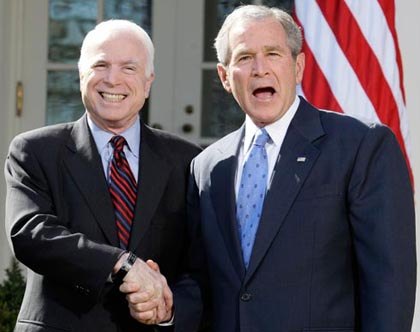Bailout Watch 122: McCain: Spend the First $25b, THEN We'll Talk
Interesting strategy: tell Michigan voters you support the bailout (small “b”) but not THE BAILOUT (big ass “B”). Well, not yet. The position is a nuanced modification of Senator McCain’s previous flip-flop. Regular readers will recall that the presidential candidate was against any bailout to American automakers– before he decided to sacrifice his principles (whatever love is) to appeal to voters inside Motown’s battleground state. The AP [via The Detroit News] reports on Senator McCain’s Detroit dirty dancing on Meet The Press. “Republican presidential nominee John McCain declined Sunday to support an additional $15 billion in funding to help U.S. automakers weather a difficult economic climate but did not rule it out… ‘Let’s get the first $25 billion to them first,’ said McCain, adding that the government could ‘see how that works before we say we’re going to give you some more.'” Right. $25b in no to low-interest loans for “retooling” will save Ford, GM and Chrysler’s bacon. Yes Chrysler. Remember Chrysler? Anway, a refresher: “Obama has also said the loan program should to be doubled to provide $50 billion.” And get this: “The Ann Arbor, Mich.-based Center for Automotive Research has estimated that General Motors Corp., Ford Motor Co. and Chrysler LLC may need a $15 billion bailout to survive the nation’s financial crisis, which has led to sluggish sales and limited the availability of credit for auto loans.” I am astounded that the AP AND The Detroit News would let such an absurd statement go unchallenged. As they BOTH well know, GM is burning through $1b per month. Shame on them.
More by Robert Farago
Latest Car Reviews
Read moreLatest Product Reviews
Read moreRecent Comments
- OA5599 Been there, done that--Fordlandia.
- MaintenanceCosts I love urban condos, but the idea of sharing an association with 50 Aston owners makes me break out in hives.
- MaintenanceCosts My dad had a closely related, but much less cool, Corolla Liftback of the same vintage when I was born. Typical of a Toyota, it was the low-drama car in the household, compared to mom's backfire-prone and fussy RX-3 wagon. Both cars got sold when we moved overseas in 1981, but neither parent had the sense to buy something low-drama again for quite a few more years.
- MaintenanceCosts When they target one specific plant well outside of contract negotiation time, you know it's bad.Even if you distrust unions, ask yourself whether an individual whistleblower could have made any difference here without the union backing him up.
- FreedMike IIRC, weren't '70s Japanese cars prone to rust?


































Comments
Join the conversation
How many here seriously believe Obama will save the U.S. car market? Or give 95% of American workers a tax cut while simultaneously promising to raise every other conceivable tax? Or make Detroit an honest city? Or lower the ocean level? Or provide "free" health care?